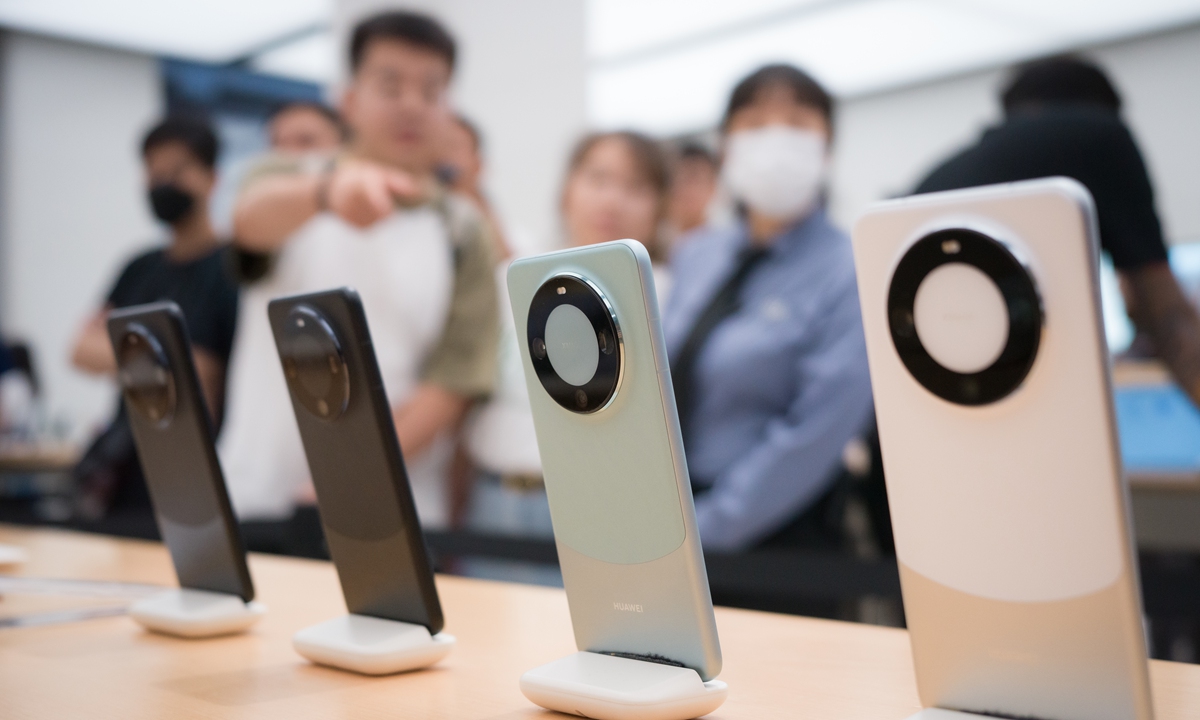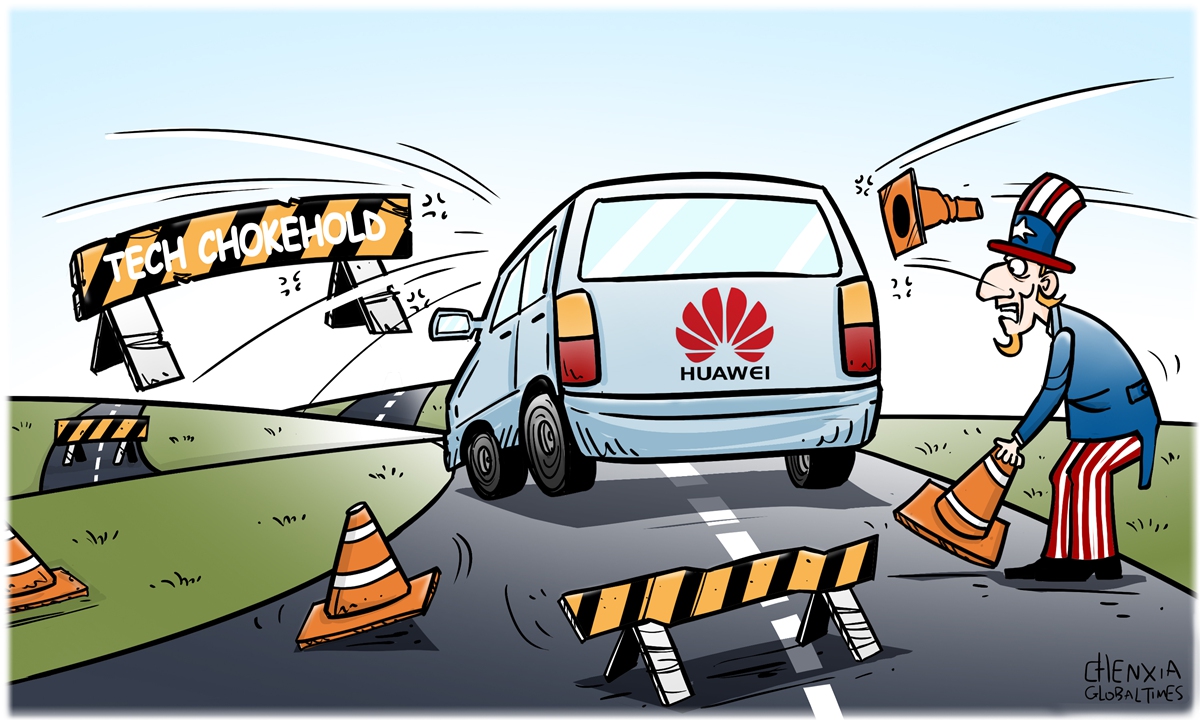China slams US' unreasonable crackdown on Chinese tech firms, as Washington reportedly probes Huawei chips

Consumers queue up to experience the new Huawei Mate 60 Pro on September 3, 2023, in Shanghai. Photo: VCG
China's Foreign Ministry on Friday slammed the US' abuse of state power in cracking down on Chinese firms, and stressed that US sanctions, containment and crackdowns won't stop China's development but will only enhance its resolve and capabilities for tech self-reliance and innovation, after the US reportedly started an investigation into Chinese-made chips used in Huawei's new phones.
The remarks came as the Chinese telecom giant started pre-sales for several new smartphone models on Friday morning, with many models sold out immediately, drawing even greater attention to Huawei, after reports of advanced chips used in its new smartphones sent shockwaves through China and abroad, particularly in the US, where officials are reportedly seeking to step up the crackdown on the company.
Chinese experts said that the growing popularity of Huawei's smartphones among Chinese consumers serves as a reminder that unilateral sanctions and crackdowns do not work and could backfire, and cooperation, not crackdown, should be the common aspiration of the world.

Breaking through barriers. Illustration:Chen Xia/GT
Crackdown won't work
At a regular press briefing on Friday, Mao Ning, a spokesperson for the Chinese Foreign Ministry, was asked to comment on the US government's official probe into an advanced Chinese-made chip in Huawei's latest smartphones.
"We oppose politicizing trade and technology issues and overstretching and abusing the concept of national security. The US has abused state power to suppress Chinese companies," Mao said, adding that such moves violate the principle of free trade and international trade rules, destabilize the global industrial and supply chains and serve no one's interests.
"I want to stress that sanctions and curbs will not stop China's development. They will only strengthen China's resolve and capability to seek self-reliance and technological innovation," the spokesperson said.
Reports of chips used in Huawei's latest smartphones have sparked widespread speculation. In the US, many anti-China politicians are once again beating the drum for more sanctions and crackdowns on the Chinese firm.
However, that didn't seem to affect consumers' enthusiasm for the company's new smartphones. On Friday morning, Huawei launched pre-orders for several new smartphone models, including the Mate X5, the new Mate 60 and Mate 60 Pro models, which sold out immediately. Another round of pre-orders took place late on Friday afternoon, and the phones were sold out within just a few minutes of their launch, the Global Times learned. The deposit is 1,000 yuan ($136), but the prices for some models have not been disclosed yet.
While the company did not disclose specific details about the chips used, there has been widespread speculation in media reports that the Mate 60 series utilizes the Kirin 9000S chip, featuring 7nm technology and stacking technology, with HarmonyOS as its operating system.
Huawei has not announced the processor model of its new foldable screen phone Mate X5, but it is expected to be equipped with the same Kirin 9000S as the Mate 60 series, and may even have the rumored Kirin 9100, according to media reports.
The topic of Friday's new launch has drawn billions of views and received more than 200,000 comments on China's social media platform Sina Weibo, as of press time, with many netizens unable to hold their excitement as they rush to place orders.
The company's new launch has flabbergasted some US officials, who are pledging to look into the new products with a suspicious mindset of whether any US technology may be involved, according to media reports. The US Commerce Department, which enacted a series of restrictions against Huawei and China's chip industry over the past two years, said it's working to get more information on a "purported" 7-nanometer processor discovered within the Mate 60 Pro, Bloomberg reported on Friday.
Huawei's latest smartphone has also triggered a debate in Washington about the efficacy of sanctions intended to contain China, the report said.
Some Western media outlets have also been hyping so-called "widening curbs on iPhone use by government workers." Reuters reported on Friday that such "curbs" have raised concerns among US lawmakers and fanned fears that US tech companies heavily exposed to China could take a hit from rising tensions between the countries.
Asked about the reported claims at a regular press briefing on Friday, Mao said that China has always promoted high-level opening-up. "Products and services from any country are welcome to enter the Chinese market as long as they comply with Chinese laws and regulations," Mao said.
The spokesperson further noted that "this is fundamentally different from the abuse and disguise of the so-called 'security' concept by certain countries to suppress and contain Chinese companies."
On August 29, Apple announced that it would be holding a press conference on September 13 (Beijing time), during which it is expected to unveil the iPhone 15 series and a new Apple Watch. Given the timing, many foreign media outlets have been hyping the competition between Apple and Huawei's smartphones in the Chinese market.
Cooperation should be pursued
The US is undoubtedly uneasy about Huawei's new phone release and reportedly pledged to launch an investigation into it, but since Huawei is confidently announcing it, both the company and its suppliers seem prepared and unintimidated, Ma Jihua, a Beijing-based senior industry analyst, told the Global Times on Friday.
The US' frustration is also a clear indication that the US' blocks against the Chinese company have failed, and they do not have any better cards to play, Ma said, adding that such sanctions only prompted Chinese companies to reduce their reliance on the US and come up with their technologies and products.
"As technical containment has proven ineffective, for the US, the most practical strategy is to move away from zero-sum games and toward a cooperative path for win-win outcomes," the expert said.
US crackdown measures have and will continue to damage the interests of US companies, analysts noted. Meanwhile, some US industry insiders have also called for cooperation.
John Neuffer, president of the US Semiconductor Industry Association, said that no country can reverse the chip supply chain, and the semiconductor industry needs China, according to Yuyuan Tantian, a social account affiliated with China Media Group.
